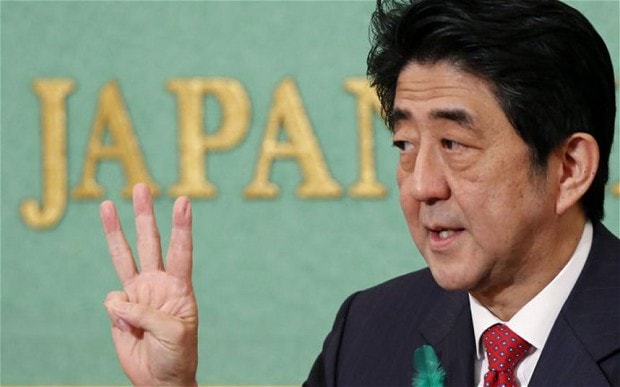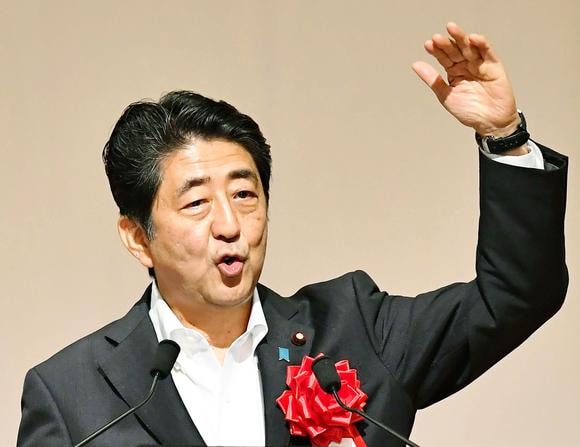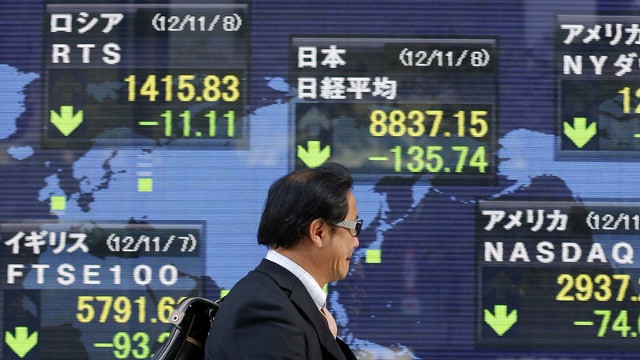Japanese Prime Minister's Multi-Targeted Arrow
(Baonghean) - Japan's massive economic stimulus package worth more than 28,000 billion yen (equivalent to 266 billion USD) is expected to help the land of the rising sun cope with the impact of Brexit. But for Prime Minister Shinzo Abe, the value of this stimulus package is even greater than that.
 |
| The three goals of Prime Minister Abe's Abenomics policy are: a strong economy, support for families with children to increase the birth rate, and social security. Photo: Telegraph. |
External factors
The “safe haven” status that investors have bestowed on the yen since British voters voted to leave the European Union (EU) is causing dismay in the Japanese government.
The reason is that investors are dumping risky assets like stocks to invest in stable assets like gold, yen, and the US dollar, causing the yen to appreciate. Meanwhile, this is a crucial point in the 3-year economic revitalization plan implemented by the Bank of Japan (BoJ) and Prime Minister Shinzo Abe. The success of stimulating the economy through a package of measures depends heavily on the cheap yen to support businesses that do business and have revenue sources abroad.
It’s a task that Tokyo has struggled with for some time. The yen has held well above 80 yen to the dollar, but it has risen more than 18% this year even as the Bank of Japan introduced negative interest rates for the first time in January.
This is a major challenge for Prime Minister Abe's "Abenomics" program to boost growth and inflation. However, the British decision is just one of many events happening outside Japan that have a strong impact on Japan. The US Federal Reserve's plan to raise interest rates this year is also a factor pushing the yen higher against the greenback.
Many economists believe that the current BoJ policy has reached its limit and cannot do much to stop the yen's rise in value in the face of global market turmoil. Despite warnings, money continues to flow into safe havens like the yen, a prime example. And so further intervention is what the Japanese government is expected to do now.
With the announcement of the stimulus package on July 27, Prime Minister Abe affirmed that Japan's goal with this huge spending is to minimize the consequences after the departure of the UK. In this support package, the Japanese Government plans to increase public spending by 13,000 billion yen, mainly investing in construction projects and upgrading infrastructure, boosting the export of agricultural products and tourism products.
The Japan Bank for International Cooperation will receive additional funding to provide more low-interest loans to Japanese companies to cope with the impact of Brexit. Tokyo also plans to increase support for Japanese companies to build infrastructure overseas.
 |
| The economic stimulus package is a new measure to consolidate Prime Minister Abe's political achievements. Photo: Nikkei. |
Reviving Abenomics
Brexit is a good opportunity for Japan to push for a drastic solution to its sluggish economy and bleak future. But it must be admitted that this stimulus package is aimed at a larger goal: to continue to strengthen the foundation of the economic strategy called Abenomics that Prime Minister Abe has been implementing. It is set in the reality that the Japanese economy has not shown many encouraging signs, proving that Abenomics has almost failed.
For example, since the beginning of 2016, when Prime Minister Abe clearly expressed his determination to implement the three arrows of this economic policy, economic growth indicators have continued to be not very positive. Japan's consumption and export indexes decreased in April; manufacturing activities decreased the most in more than 3 years. The continuous appreciation of the yen due to Brexit has further impacted export promotion activities, one of the important goals of Abenomics. Economic stimulus packages have appeared one after another, but the economy is not very bright, especially consumer purchasing power has not improved.
This result forced the Abe administration in early June to postpone the planned increase in consumption tax for the second time by 2.5 years, instead of April 2017 as previously planned. This postponement is to avoid putting more burden on consumers and hindering economic growth. Many experts assert that the decision to postpone the tax increase shows the failure of Abenomics.
 |
| The strong yen is an obstacle to Abenomics, as well as Japan's economic recovery. Photo: NPR. |
Political "leverage"
The launch of a huge economic stimulus package, along with the postponement of the tax increase two months ago, seems to be a temporary measure as the Japanese economy is still not going according to plan.
However, many experts believe that all of this is within Prime Minister Abe's expectations, and that this is even a solution to maintain the balance in the political arena. For example, lawmakers from the Komeito Party, a partner in Mr. Abe's ruling coalition, believe that the proposal to postpone the tax increase for 2.5 years is politically motivated. If the tax increase plan is delayed until October 2019, when the Lower House and local government elections nationwide have taken place, Mr. Abe will not have to worry about the tax increase affecting the election results.
Some speculation suggests that Mr. Abe may even call for early elections for the Lower House of Parliament to gain voter support and facilitate economic policies, as well as other controversial issues of the administration.
But optimists say the stimulus package should be viewed positively alongside the 73 trillion yen in social security spending that the Japanese government allocated for fiscal 2016. This includes increased support for low-income households, expanded childcare services and other health care programs that address the declining birthrate.
Those priorities help solve the burning issues in current Japanese society. And obviously, resonate and promote the overall effectiveness of Abenomics solutions.
Thanh Son
| RELATED NEWS |
|---|

